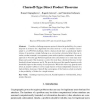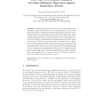2967 search results - page 517 / 594 » Cryptology |
103
click to vote
CRYPTO
2007
Springer
15 years 6 months ago
2007
Springer
Consider a challenge-response protocol where the probability of a correct response is at least α for a legitimate user and at most β < α for an attacker. One example is a CAP...
CRYPTO
2007
Springer
15 years 6 months ago
2007
Springer
Abstract. Secure multiparty computation allows a group of distrusting parties to jointly compute a (possibly randomized) function of their inputs. However, it is often the case tha...
101
click to vote
EUROCRYPT
2007
Springer
15 years 6 months ago
2007
Springer
We investigate a general class of (black-box) constructions for range extension of weak pseudorandom functions: a construction based on m independent functions F1, . . . , Fm is gi...
EUROCRYPT
2007
Springer
15 years 6 months ago
2007
Springer
Significant progress in the design of special purpose hardware for supporting the Number Field Sieve (NFS) has been made. From a practical cryptanalytic point of view, however, no...
EUROCRYPT
2007
Springer
15 years 6 months ago
2007
Springer
Abstract. Multiparty signature protocols need protection against roguekey attacks, made possible whenever an adversary can choose its public key(s) arbitrarily. For many schemes, p...


